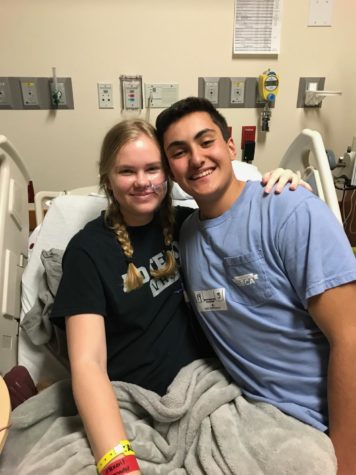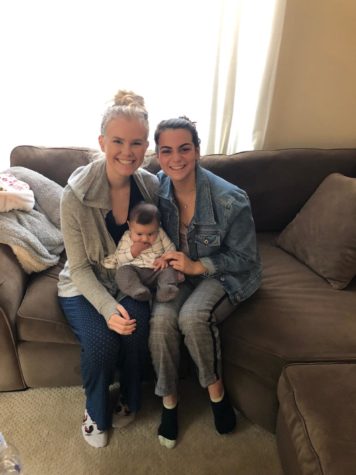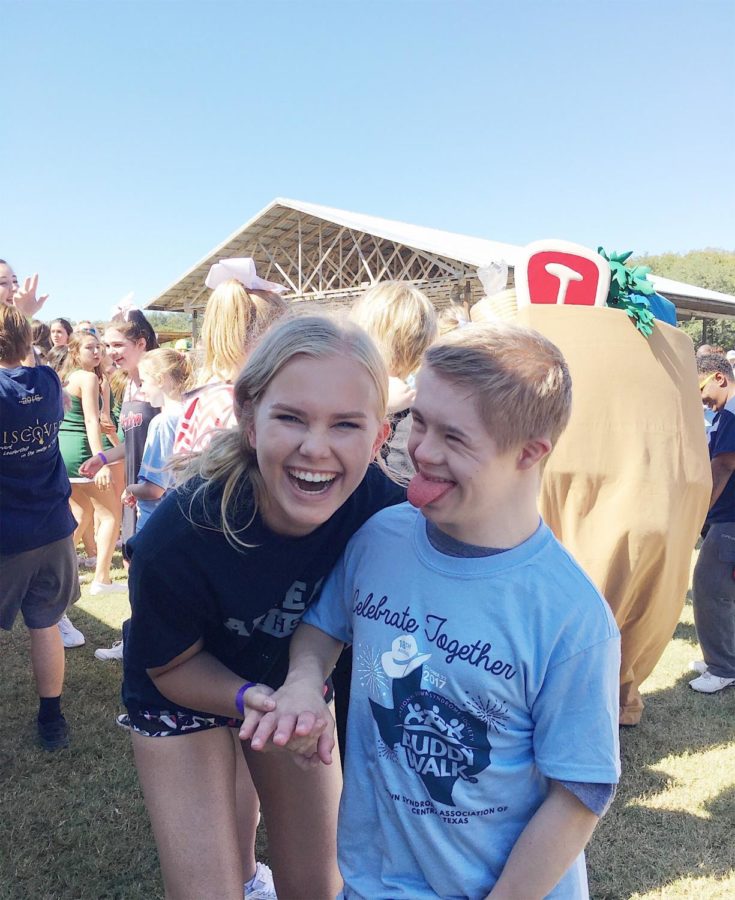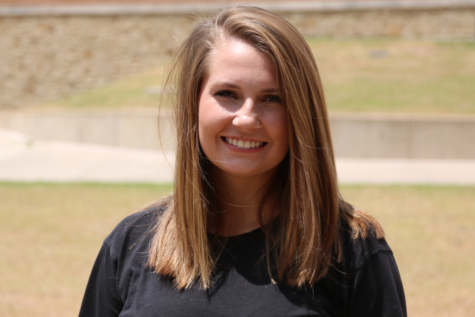More than a diagnosis
Senior keeps positive attitude after learning of medical conditions
Photo submitted by Kiersten Dyke
Kiersten and her good friend, Jake Labay at the annual Buddy Walk.
December 18, 2018
She is sweet.
She is not scared.
She is strong.
She is not the “sick girl.”
Senior Kiersten Dyke was diagnosed last year after visiting an ophthalmologist where she found out her optic nerves were swollen. After discovering that she was having issues with her eyes, she was sent in for a spinal tap, an MRI, and an MRV.
“I went through all the phases,” Kiersten said. “I was mad, I kept thinking things like ‘why me’ and I would think it’s not fair, I did nothing to deserve this. But then I realized, that I’m so grateful that I went through this because if I hadn’t, I wouldn’t have discovered all these things about me.”
In March, Kiersten was diagnosed with her first medical condition – intracranial hypertension. That summer, she had to travel out to Pennsylvania where doctors told her she had severe stenosis of the superior sagittal sinus and the transverse sinus. While in Pennsylvania, Kiersten had to undergo brain surgery and have a stent placed to help with blood flow. She has to travel often for treatments as many doctors in Austin simply don’t have the resources or the knowledge to deal with her conditions.
“The first few months were the hardest,” Kiersten’s mother, Iben Dyke said. “We didn’t have a diagnosis, and we didn’t find much help from doctors in Austin. Now she has a great medical team but unfortunately, we have to travel to Houston and even Pennsylvania to get the best care.”

Kiersten’s boyfriend, Dominic Cinfio, visited her in the hospital.
Kiersten spent months in and out of school with no solidified knowledge of what was happening, as even the doctors were unaware. Eventually, she finally got results from tests and had three main disorders. Beyond her intracranial hypertension, Kiersten also has MALS, dysautonomia and a connective tissue disorder.
“Something that was really important was just not feeling sorry for myself,” Kiersten said. “I don’t want pity, I don’t want to be treated like the sick girl. When I was first going through this, I had no idea what was wrong with me for the first several months. I was confused.”
As her medical issues progressed, her support from those around her, family, friends and classmates, expanded. Some of her friendships even flourished because of her sickness due to hospital visits as her friends tried to understand what was happening and help her get through it.
“Her sickness was very slow,” Kiersten’s best friend, Piper Swearengin said. “She wouldn’t be at school and we knew she was sick and then all of the sudden, she was in the hospital. I was like, if my classmate is sick, I want to do something nice for her.”
Kiersten is passionate about helping others, specifically special needs children. She is involved in the PALS program, which is a leadership and mentor organization that volunteers in the community and helps children at local feeder schools. She is also an AD Team officer, she continues to diligently serve with this team as much as she can.
“Kiersten is one of the most amazing young ladies I have ever worked with,” PALS teacher Laura Freund said. “She has the biggest heart for helping others. With all that Kiersten has gone through, she has some pretty good reasons to be focusing on herself, but she doesn’t. She never does. If she is at all able, she will step up, help and volunteer. This girl is gem.”
Kiersten’s support system is also a large contributor to her endless positivity. Her mother is a licensed therapist and counselor, which Kiersten says has assisted her a lot throughout the process.
“Ever since I was little I’ve always been very happy and optimistic,” Kiersten said. “[What helped] has been my family support and my friends and just doing normal things and feeling okay with what’s going on in my body. Accepting it and not pushing it off to the side [has] made me ten times better of a person.”
Moving forward, Kiersten plans to continue on a path of assisting those with special needs. She is very passionate about what she does and hopes to pursue that in the future.
“I’m very involved in the ICAP programs at our school,” Kiersten said. “I’m an ambassador connecting the two, with an inclusion between special needs and GenEd. I’m super passionate about it, it’s something I want to do when I’m older as a career. I love anything to do with helping others, but mostly [those with] special needs.”

Kiersten and her best friend Piper Swearengin visiting a friend’s baby.
Though Kiersten has always been positive and that has stayed the same throughout her life, there are a few details about her that she says have been changed since her diagnosis.
“One word that I never would have used to describe myself as before would be strong, but now I think that’s what I would describe myself as,” Kiersten said. “I’m so grateful for who I am today, I mean, I’m pretty much the same person, but I’m a lot more in tune with the world.”
That’s not all, though. This process has not only taught her more about who she is, but also about what she values and what should remain as an unimportant afterthought.
“I don’t care about things so much anymore,” Kiersten said. “I used to care about what people thought of me or how something looks on me. Now all I really care about is being happy and healthy.”
Kiersten also says that she has learned more about attitudes toward others. Though her kindness has always been prominent, that quality holds more value to her now.
“I’ve learned to always be kind to others,” Kiersten said. “You never know what someone’s going through, like everything I have is invisible. When people see me, they don’t know and they might be really rude, so I’ve learned that being kind is all that actually matters.”







